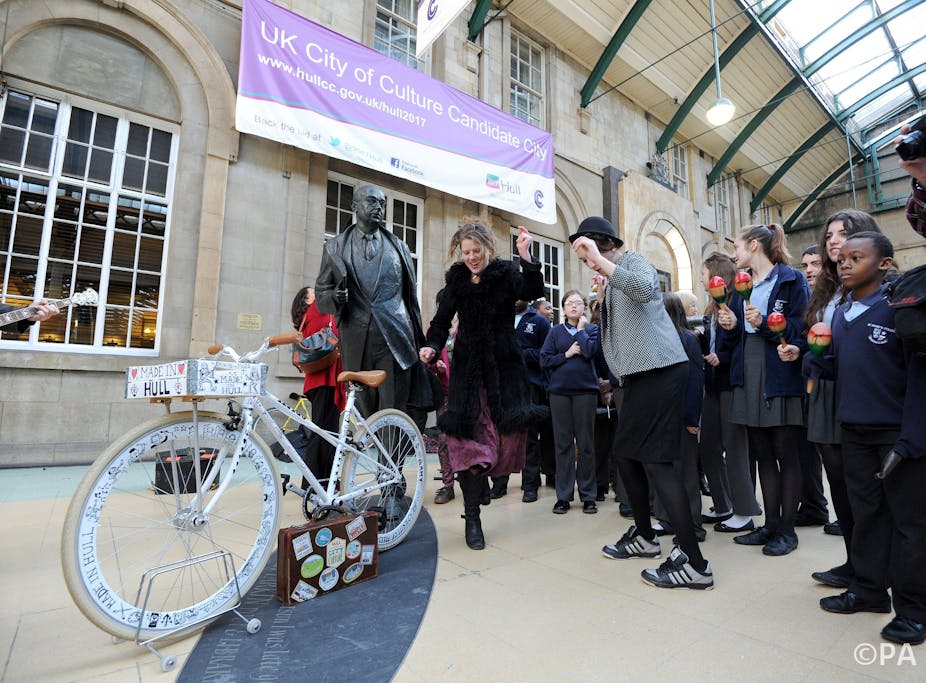Kingston-upon-Hull has been named the UK City of Culture for 2017; a spotlight has been thrown on a place that many people either don’t really know much about, sometimes falling prey to typical Home Counties misconceptions or clichés. Whilst it is well known that Hull was once one of the world’s greatest fishing ports, there are many other sides to the city that are less evident. This award is a welcome reflection of Hull’s remarkable historical heritage, and the long-term creativity of Hull people.
Hull’s unique story is as much global and maritime as it is local or regional, and the port’s engagement with the rest of the world is as old as the place itself. Mentioned by Chaucer in the Shipman’s Tale, Hull had, by the time he was writing, already long been a prominent medieval port; even before its first Royal Charter was granted by Edward I in 1299, its people and ships were sailing down the Humber to the great waters beyond. They have continued to cross the seas over every subsequent century and have made their individual mark in virtually every corner of the world.
City of seafarers
The seas and oceans can be regarded as the original World Wide Web, and Hull people and ships played a significant role in opening up and trading across the world’s seaways. They also took their ideas and attitudes with them.

A few of the most famous stories, such as Hull-born William Wilberforce’s role in the abolition of slavery or Amy Johnson’s trail-blazing flights across the world’s oceans, are well known; but far fewer people know much of Hull’s Sir John Hall and his long battle to give women the vote in New Zealand in 1893, 25 years before the UK’s first and more limited female suffrage act was passed. Similarly, too few remember James Evans, who developed a written language for the Cree Nation in North America.
Hull’s site and situation have always played an important part in moulding the outlook and attitudes of its people. The atmospheric Old Town, a medieval cluster of cobbled streets, grew up at the place where the River Hull joins the broad brown-mud Humber estuary. The city is set in a land of huge skies, amongst flat green fields many miles from urban conurbations.
There is a strong case to suggest that over the centuries Hull’s distinctive geographical situation has permeated the attitudes and personalities of so many of its people. There is an independence of outlook and love of freedom expressed here in innumerable ways, whether in the unique white telephone boxes, the distinctive local accent, or the political will to close the town’s gates against an authoritarian Charles I – even before the start of the Civil War.
So many tales of this city’s people tell us much of their willingness to plough their own furrows. Time and again Hull people have demonstrated an independence of spirit and a readiness to resist the oppressive corporate world: look at the long and eventually successful medieval struggle with the Hanseatic League, or the building of a completely new railway in the late 19th century – thwarting what was seen as the North Eastern Railway Company’s transport monopoly.
Pioneering spirit
Many people from the town have led pioneering lives. Look at John “Gassy” Jack Deighton, a sailor and former gold prospector, widely regarded as the man who founded Vancouver, British Columbia; or Hull-born property and shipping magnate Sir John Ellerman, who has not only been described as a classic “lone wolf” in business but who was the richest person to have ever lived in the United Kingdom when he died in the 1930s.
This short survey gives me inadequate time to talk fully about such other locally born people; people like Charles Voysey, now considered one of the pioneers of modern architecture, or Sir Joseph Duveen, who played an important role in developing the modern international art market and gave us the Duveen Galleries at the British Museum and Tate – to say nothing of the many academics from Hull University who have contributed so much in the fields of culture, engineering and science.

This independence of approach and regard for liberty have also manifested themselves in so many creative lives, from Andrew Marvell to Philip Larkin, from Mick Ronson to new groups such as La Bete Blooms – to say nothing of the hymn tunes of the nineteenth century composer John Bacchus Dykes, who gave us the haunting music to “Eternal Father Strong to Save”, the most famous maritime hymn in the world.
Then there are the many Hull-born actors, including Tom Courtenay, Barrie Rutter, John Alderton, Ian Carmichael and Maureen Lipman (to name but a few). Meanwhile, Tracey Seaward has made her mark as the producer of films such as “Dirty Pretty Things”, “The Queen” and “War Horse” and as the producer of the London Olympic Games opening ceremony.
The people of Hull’s enduring ability to think outside of a dull corporate suit is one of the city’s great assets in the creative and information-led modern world. It is this pioneering and creative spirit, I would argue, that has so enriched the city’s cultural scene – and won it the title of City of Culture 2017.

